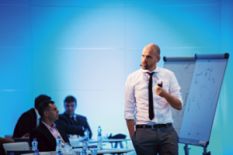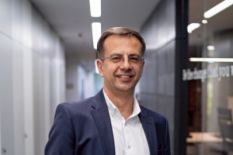Valerii Pekar, the businessman, the professor of the Kyiv-Mohyla Business School (kmbs) and co-founder of Nova Kraina (New Country) Civic Platform, told Destinations about the prospects of the human capital.
– You said in one of the interviews, “Natural resources, production assets and human capital are three elements of national wealth.” Which is the most important?
Neither of these three elements must be given priority. On the contrary, balance is necessary. The human capital plays the key role in the present-day world, but the countries that have not developed the innovation economy yet have to act as the “world’s workshop”, so they cannot go without classic production assets. At the same time, the global fight for natural resources is increasing, so we must provide ourselves with our own ones in the least. So all three elements must be balanced.
– What is the human capital resource like in Ukraine now?
We still are the educated nation with relatively low expenditures for labour remuneration, which is supposed to attract investors (unfortunately, they are scared away by the poor protection of property rights). We must emphasise that the human capital is not only knowledge, skills and competence. There are deeper things: values and thinking paradigms. In this regard, existence of a considerable group of people with contemporary critical thinking is of special importance (according to different estimates, there are 15-20 %, which is not much in comparison with the European countries, but much more than in the typical countries of the “world’s workshop”). There are prospects for investment into the innovation economy, and we can already see that Ukraine is gradually ranking higher not only in software development, but also design, engineering, video production, fashion etc. Revival of the air space prospects and participation in creation of new industries of the future are ahead.
– The social and political circumstances have changed considerably in Ukraine. How has the Ukrainian society transformed as a result?
How have the events of the last seven years influenced the people?
On the one hand, the European identity of the Ukrainians and the Euro-Atlantic choice of the entire country have been demonstrated brighter. The multi-vector approach, which used to be popular in the society, has broken down owing to the Russian aggression, and now few people dream of friendship with the empire. The vast majority of Ukrainians feel they are members of the large and diverse European community. It is also encouraged by the visa-free travel, which gives millions of Ukrainians a chance to travel and see Europe with their own eyes.
At the same time, the share of people who feel the broadest limits of their responsibility for the world has grown considerably owning to the volunteers. Ukraine is getting more and more tolerant, the level of social trust is growing, which might seem surprising in the country at war, but let’s remember that hundreds of thousands volunteers stood up against the aggressor in addition to the Armed Forces. It has not only developed trust and responsibility, but also made the people reconsider their place on the planet, which is very valuable for the Ukrainian future.
– There is a Ukrainian popular wisdom: you are poor because you are stupid. But the Ukrainians have always been famous for their talents. Then what is the problem?
“A rich country of poor people,” that is what Yaroslav Hrytsak, a historian and a political writer, said about Ukraine once. Limited-access economic institutions (in other words, the low level of economic freedom) prevent the people from economic personal fulfilment and transformation of talents, initiatives and ambitions into wealth. I mean the high level of the monopoly, the large state-owned sector of the economy, the limited access to markets and capital, the high level and lack of transparency of taxes, and administrative pressure on business. The new government’s main task is to eliminate all these restrictions and to develop open-access institutions.
– Which tendencies will precondition development of the human capital in the nearest years, on a global scale and for Ukraine in particular?
The most powerful factor is Artificial Intelligence, which destroys dozens of occupations and hundreds of millions of jobs in the world. Of course, new occupations and new jobs will appear. The only question is whether the dismissed workers can be re-trained. I suspect that many of them will turn into unnecessary people, which will create a number of social issues even in terms of paying them the guaranteed income. Therefore, problem number one for Ukraine is the same as for the developed countries of the world: training and re-training adults.
– The country is its people. Given today’s transformation of the society, can we forecast when Ukraine will turn into a real rule-of-law
and wealthy state?
Ukraine has already passed a long way, but the traditional Bible story of 40 years taken by major social transformations has some grounds. We are already farther than midway.
– How do you see Ukraine in 25 years, when another generation comes?
On the one hand, Ukraine will be a typical European country with certain Mediterranean attributes: a bit slower pace of life, family values, good cuisine, and moderate wealth in comparison with the North etc. On the other hand, the country will have the powerful innovation sector. Also, Ukraine will remain at the front, resisting the chaos approaching from the north-east. It means we will see really different social roles and practices that will co-exist peacefully in quite a mosaic country united by the traditional Ukrainian imperative of freedom.







